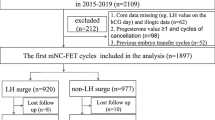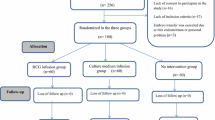Abstract
Purpose
To evaluate the clinical efficacy of letrozole on ovulation induction and hormone replacement therapy (HRT) during endometrial preparation for frozen–thawed embryo transfer (FET).
Methods
We analyzed totally 1,230 cycles of patients that underwent FET from October 2010 to September 2012. Seven hundred and thirteen cycles of patients with ovulation disorders that underwent FET were randomly assigned to two groups by case control study. 359 cycles received letrozole ovulation induction and 354 cycles received HRT during endometrial preparation for FET, respectively. In the corresponding period, 517 cycles of patients with normal ovulation in the natural cycle group for FET endometrial preparation served as controls. Reproduction-related clinical outcomes of patients in the three groups were compared.
Results
The embryo implantation rate of patients in letrozole group (30.4 %) was significantly higher than the HRT group (22.8 %, P < 0.05). The clinical pregnancy rate of patients in the letrozole group (53.2 %) was significantly higher than the HRT group (44.4 %, P < 0.05), while no significant difference was observed between the letrozole and natural cycle groups (51.3 %, P > 0.05). Estradiol levels on the day of human chorionic gonadotropin administration in the letrozole group were significantly lower than those in the natural cycle group (280.32 ± 125.39 pg/ml and 351.06 ± 123.03 pg/ml, respectively; P < 0.05). The live birth rate of patients in letrozole group (44.6 %) was significantly higher than the HRT group (32.5 %, P < 0.05), while abortion rate (12.0 %) was significantly lower than the HRT group (21.0 %, P < 0.05). There were no significant differences in number of mature follicles, endometrial thickness, duration of follicle growth between the letrozole and the natural cycle groups, and there were no significant differences in twin birth rate and ectopic pregnancy rate among the three groups (all P values >0.05).
Conclusions
Ovulation induction with letrozole during endometrial preparation for FET has a higher rate of pregnancy success and a lower abortion rate than HRT. Letrozole treatment exhibits clinical progression and outcomes similar to those patients undergoing a natural cycle or normal ovulation cycle. Therefore, letrozole treatment may be an effective option in endometrial preparation for FET in patients with ovulation disorders or irregular menstruation.
Similar content being viewed by others
References
Chen S, Kong L, Huang M (2000) Clinical application of frozen-thawed embryo transfer. First Military Med Univ 20:74–76
Zhou F, Lin XN, Tong XM, Li C, Liu L, Jin XY, Zhu HY, Zhang SY (2009) A frozen-thawed embryo transfer program improves the embryo utilization rate. Chin Med J (Engl) 122:1974–1978
Aflatoonian A, Oskouian H, Ahmadi S, Oskouian L (2010) Can fresh embryo transfers be replaced by cryopreserved-thawed embryo transfers in assisted reproductive cycles? A randomized controlled trial. J Assist Reprod Genet 27:357–363
Guzeloglu-Kayisli O, Basar M, Arici A (2007) Basic aspects of implantation. Reprod Biomed Online 15:728–739
Wu W, Mao Y, Wang W, Ding W, Huang J, Diao F, Ma Y, Liu J (2010) Comparison of the effect of different endometrial preparation methods on the clinical outcome of 1,372 frozen-thawed embryos transfer. Acta Uni Med Nanjing Nature Sci 30:1469–1474
Krusche CA, Herrler A, Classen-Linke I, Beier HM (2000) The progesterone antagonist onapristone retards the advanced endometrial transformation after gonadotropin stimulation in rabbits. Steroids 65:773–782
Wang QL, Song J, Chen SL, Luo C, Chen X, Li M, Ni YP (2009) Analysis of the clinical outcomes of IVF-ET treatment in infertile patients with polycystic ovary syndrome or polycystic ovaries. Nan Fang Yi Ke Da Xue Xue Bao 29:962–965
Requena A, Herrero J, Landeras J, Navarro E, Neyro JL, Salvador C, Tur R, Callejo J, Checa MA, Farre M, Espinos JJ, Fabregues F, Grana-Barcia M (2008) Use of letrozole in assisted reproduction: a systematic review and meta-analysis. Hum Reprod Update 14:571–582
Healey S, Tan SL, Tulandi T, Biljan MM (2003) Effects of letrozole on superovulation with gonadotropins in women undergoing intrauterine insemination. Fertil Steril 80:1325–1329
Geng Q, Guo S, Quan S, Xing F (2010) Clinical observation of effects on follicular development and endometrium with letrozole for ovulation. Pract Med 26:2209–2211
Mitwally MF, Casper RF (2001) Use of an aromatase inhibitor for induction of ovulation in patients with an inadequate response to clomiphene citrate. Fertil Steril 75:305–309
Badawy A, Abdel Aal I, Abulatta M (2009) Clomiphene citrate or letrozole for ovulation induction in women with polycystic ovarian syndrome: a prospective randomized trial. Fertil Steril 92:849–852
Bao SH, Sheng SL, Peng YF, Lin QD (2009) Effects of letrozole and clomiphene citrate on the expression of HOXA10 and integrin αvβ3 in uterine epithelium of rats. Fertil Steril 91:244–248
Cummins JM, Breen TM, Harrison KL, Shaw JM, Wilson LM, Hennessey JF (1986) A formula for scoring human embryo growth rates in in vitro fertilization: its value in predicting pregnancy and in comparison with visual estimates of embryo quality. J In Vitro Fert Embryo Transf 3:284–295
Hong QQ, Cai RF, Kuang YP (2010) Study on endometrial preparation with letrozole in frozen-thawed embryo transfer. Reprod Contra 30:445–448
Pritts EA, Yuen AK, Sharma S, Genisot R, Olive DL (2011) The use of high dose letrozole in ovulation induction and controlled ovarian hyperstimulation. ISRN Obstet Gynecol 2011:242864
Bedaiwy MA, Abdelaleem MA, Hussein M, Mousa N, Brunengraber LN, Casper RF (2011) Hormonal, follicular and endometrial dynamics in letrozole-treated versus natural cycles in patients undergoing controlled ovarian stimulation. Reprod Biol Endocrinol 21(9):83
Wang L, Qiao J, Liu P, Lian Y (2008) Effect of luteinized unruptured follicle cycles on clinical outcomes of frozen thawed embryo transfer in Chinese women. J Assist Reprod Genet 25:229–233
Givens CR, Markun LC, Ryan IP, Chenette PE, Herbert CM, Schriock ED (2009) Outcomes of natural cycles versus programmed cycles for 1,677 frozen-thawed embryo transfers. Reprod Biomed Online 19:380–384
Li YF, Zhu GJ, Zhang HW (2009) Comparison of 3 methods of preparing endometrium for frozen-thawed embryo transfer. Reprod Contra 29:113–116
Conflict of interest
The authors declare that they have no conflict of interest.
Author information
Authors and Affiliations
Corresponding author
Additional information
S. Li and Y. Zhang contributed equally to this work as co-first authors.
Rights and permissions
About this article
Cite this article
Li, Sj., Zhang, Yj., Chai, Xs. et al. Letrozole ovulation induction: an effective option in endometrial preparation for frozen–thawed embryo transfer. Arch Gynecol Obstet 289, 687–693 (2014). https://doi.org/10.1007/s00404-013-3044-0
Received:
Accepted:
Published:
Issue Date:
DOI: https://doi.org/10.1007/s00404-013-3044-0




